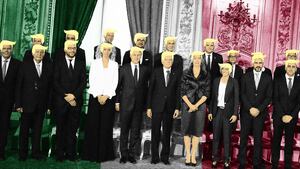JERUSALEM—Prime Minister Benjamin Netanyahu has chosen an improbable way of celebrating the 70th anniversary of Israel’s founding: He’s palling around with neo-fascists and coddling Holocaust revisionists.
The year 2018 has seen Netanyahu embracing a parade of such leaders and, in a no less perplexing twist, we've had the Jewish state blatantly dismissing the needs of Diaspora Jews as they face mounting antisemitism and insecurity in Western countries roiled by social unrest.
Consider the past week.
On Thursday, Netanyahu acknowledged that he is negotiating with Hungarian Prime Minister Viktor Orbán for an acceptable “consensus narrative” in which the Hungarian state’s part in the Nazi crimes that wiped out half a million Hungarian Jews during World War II will be minimized, if not erased, in a new revisionist Holocaust museum to be opened in Budapest.
On Tuesday Netanyahu was welcoming Matteo Salvini, Italy’s new, nationalist interior minister to Jerusalem.
Salvini, you guessed it, is a close European ally of Orbán. He acceded to his post last summer and has become Western Europe’s de facto leader of the populist anti-immigration movement since.
Italian Jews are not thrilled by the visit. A statement written by philosopher and painter Stefano Levi Della Torre and circulated among Italian Jewish communities says it is “alarming that Netanyahu is about to provide Salvini with a pro-Israel license [that would] exonerate him from the suspicions of anti-Semitism while he carries on with his xenophobic, racist campaign and with his alliances with anti-Semitic forces in Italy and Europe.”
A few hours ahead of his arrival, an irritated Salvini told Israel’s Foreign Press Association that “the growing anti-Semitism goes together with Islamic extremism, to which no one is paying attention.” Thus letting old-fashioned European fascist anti-Semitism off the hook. Salvini added, “I don’t have to justify myself every time I go to Israel.”
Protests were planned for Salvini’s visit to Yad Vashem, Israel’s Holocaust memorial, and Israel’s President Reuven Rivlin, who opposes Netanyahu’s cozy rapport with neo-fascists, announced he would not be receiving Salvini.
If you scratch beneath the surface of Netanyahu’s new friendships, the picture becomes clear: Like Britain’s UKIP and possibly like U.S. President Donald Trump, Netanyahu hopes to destabilize what has come to be known as “the international order.”
One way he is trying to do this is by encouraging European nations to break EU ranks and move their embassies to Jerusalem, as Trump has. Last month, Netanyahu welcomed Czech President Milos Zeman to Israel and accompanied him as Zeman opened a “Czech House” in the Israeli capital.
Jerusalem is burbling with rumors that Austrian Chancellor Sebastian Kurz, who visited Israel in October and hopes to defeat Israel’s boycott of his Freedom Party ministers who represent a onetime neo-Nazi movement, may move his embassy to Jerusalem.
In September, Philippines President Rodrigo Duterte was embraced by Netanyahu, even though he is a self-professed fan of Adolf Hitler who said he’d “be happy” to emulate Hitler by exterminating 3 million drug users and vendors.
Netanyahu recently announced his plans to attend the inauguration of Brazilian President-elect Jair Bolsonaro, another figure on the nationalist far right who is dangling the possibility of moving his embassy to Jerusalem as an enticement for Netanyahu.
President Rivlin, who has become more vocal on the subject, told CNN last week that “you can't say we admire the State of Israel and want ties with it, but we're neo-fascists.”
In July it was Orbán’s turn for a whirl around Jerusalem, and that is when they may have discussed plans for the House of Fates, an institution intended to instill in the public a revisionist interpretation of Holocaust history, a “consensus narrative” in which the murder of more than half a million Hungarian Jews, enabled by the Nazi-allied government of Miklós Horthy, will be reconfigured.
The Israeli foreign ministry holds that any new Holocaust museum should stick to the historical record “as it is depicted in Yad Vashem and in Washington’s Holocaust Museum,” but was overruled by Netanyahu, who is also Israel’s foreign minister, and its representatives were shut out of talks between Orbán and Netanyahu officials last week in Jerusalem.
Yair Lapid, leader of the centrist opposition party Yesh Atid, and the son of a Holocaust survivor, described Netanyahu’s action as “appalling.”
Netanyahu’s agreement “to Hungary's attempt to eliminate its part in the Holocaust is appalling,” he tweeted. “The Hungarians were deeply involved in the destruction of Hungarian Jewry as part of the murder machine. The only response to Orbán’s is that the museum should reflect the truth and nothing else. No negotiations, no consensus, just truth.”
Orbán has appointed Maria Schmidt, an historian and the leader of a movement to rewrite the Holocaust, to lead the House of Fates. Schmidt first made her name whitewashing history as the founder of Budapest’s House of Terror, a pseudo-museum advancing the theory that the suffering of eastern European nations who fell into the Soviet sphere of influence after WWII was worse than the suffering inflicted by the Nazi régime in Germany.
Schmidt, one of Orbán’s closest associates, was most recently associated with an overt act of political antisemitism Orbán has refused to condemn: last week’s cover of Figyelő, the “conservative Christian” business magazine owned by Schmidt, showed the face of Hungarian Jewish community president András Heisler surrounded by banknotes.
An Orbán spokesperson told World Jewish Congress president Ronald Lauder that any comment would “be contrary to freedom of the press.”
The Netanyahu high-wire act on Holocaust revisionism has reached an apex just as the European Union is grappling with a frightening upswing in European antisemitism.
On Thursday, rejecting several points Netanyahu had advanced, the EU adopted a new working definition of antisemitism.
Some EU states fear that the definition issued by the International Holocaust Remembrance Alliance (IHRA) that has been adopted by over 20 countries and that Israel pushed for, could stifle criticism of Israeli policy in the occupied Palestinian territories.
The IHRA states that some criticism of Israel can be considered anti-Semitic, including “denying the Jewish people their right to self-determination, e.g., by claiming that the existence of a State of Israel is a racist endeavor, or by applying double standards to Israel not imposed upon other nations.”
The EU chose to use the IHRA definition merely as a “guidance tool.”
A second EU survey published Monday reported that an astonishing nine out of 10 European Jews believe anti-Semitism has worsened in their countries over the past five years and more than one third are considering emigration.
The report prepared by the European Union Agency for Fundamental Rights (FRA) was based on a poll of 16,000 respondents in 12 member states.
Almost 30 percent of the respondents said they had experienced some form of anti-Semitic harassment in the past year, and 2 percent reported having been physically attacked, with a further 2 percent saying their property had been deliberately vandalized in the past year because they were Jewish.
In October, following the deadly attack against the Tree of Life synagogue in Pittsburgh, Netanyahu biographer Anshel Pfeffer said that whereas “Netanyahu wants the right to speak as the representative of all Jews, in America and Europe he's abandoned all pretense of solidarity with them.”
In 2015, upon returning to Israel from a memorial ceremony for French Jews murdered in a terror attack, Netanyahu said, "I went to Paris not just as the prime minister of Israel but as a representative of the entire Jewish people."
In fact, Pfeffer notes, “the elected leader of a country in which less than half the Jews of the world live (and only a quarter of them actually voted for him in the last election) wants the right to address the world as the representative of all Jews. And he won’t even check with them first.”






